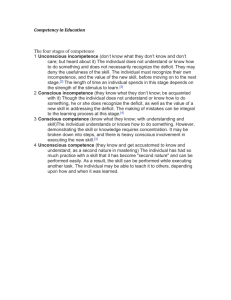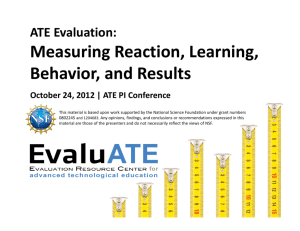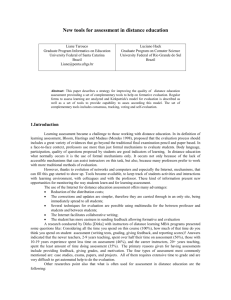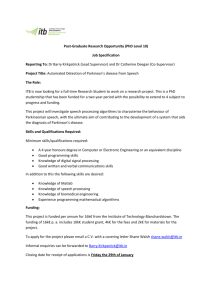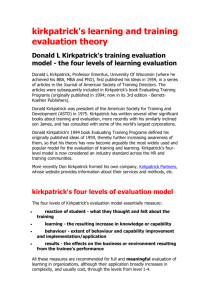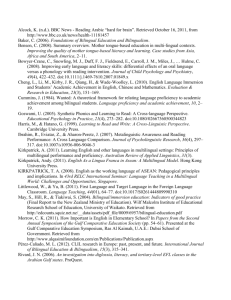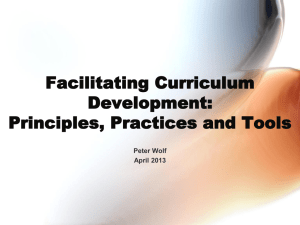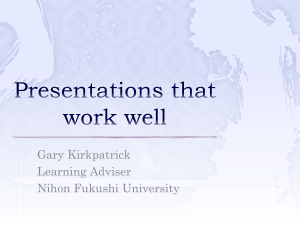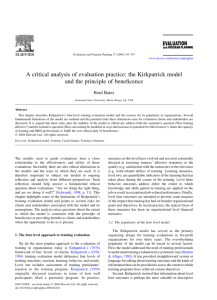Educational Theory for a Free Market in Education
advertisement
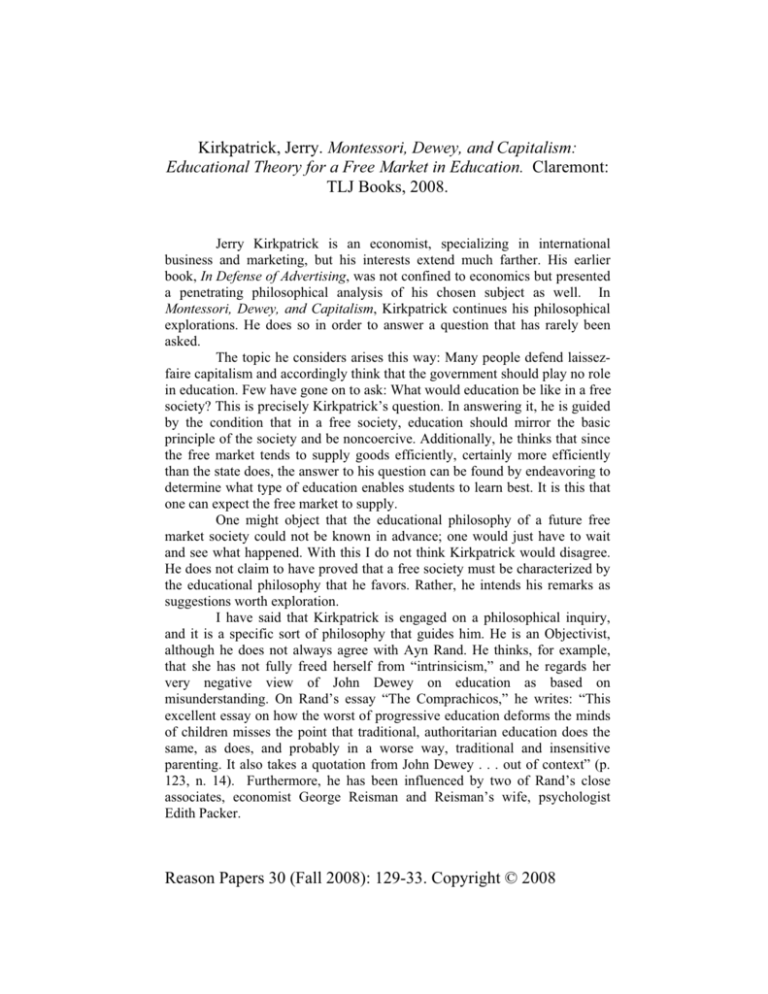
Kirkpatrick, Jerry. Montessori, Dewey, and Capitalism: Educational Theory for a Free Market in Education. Claremont: TLJ Books, 2008. Jerry Kirkpatrick is an economist, specializing in international business and marketing, but his interests extend much farther. His earlier book, In Defense of Advertising, was not confined to economics but presented a penetrating philosophical analysis of his chosen subject as well. In Montessori, Dewey, and Capitalism, Kirkpatrick continues his philosophical explorations. He does so in order to answer a question that has rarely been asked. The topic he considers arises this way: Many people defend laissezfaire capitalism and accordingly think that the government should play no role in education. Few have gone on to ask: What would education be like in a free society? This is precisely Kirkpatrick’s question. In answering it, he is guided by the condition that in a free society, education should mirror the basic principle of the society and be noncoercive. Additionally, he thinks that since the free market tends to supply goods efficiently, certainly more efficiently than the state does, the answer to his question can be found by endeavoring to determine what type of education enables students to learn best. It is this that one can expect the free market to supply. One might object that the educational philosophy of a future free market society could not be known in advance; one would just have to wait and see what happened. With this I do not think Kirkpatrick would disagree. He does not claim to have proved that a free society must be characterized by the educational philosophy that he favors. Rather, he intends his remarks as suggestions worth exploration. I have said that Kirkpatrick is engaged on a philosophical inquiry, and it is a specific sort of philosophy that guides him. He is an Objectivist, although he does not always agree with Ayn Rand. He thinks, for example, that she has not fully freed herself from “intrinsicism,” and he regards her very negative view of John Dewey on education as based on misunderstanding. On Rand’s essay “The Comprachicos,” he writes: “This excellent essay on how the worst of progressive education deforms the minds of children misses the point that traditional, authoritarian education does the same, as does, and probably in a worse way, traditional and insensitive parenting. It also takes a quotation from John Dewey . . . out of context” (p. 123, n. 14). Furthermore, he has been influenced by two of Rand’s close associates, economist George Reisman and Reisman’s wife, psychologist Edith Packer. Reason Papers 30 (Fall 2008): 129-33. Copyright © 2008 Reason Papers Vol. 30 Kirkpatrick begins with an account of the history of education. In antiquity and the Middle Ages, the dominant emphasis was on a fixed body of knowledge that students had to learn by rote. Getting them to do this often involved physical discipline: children were viewed as evil by nature and had to be beaten into submission. Kirkpatrick discusses a number of reformers, beginning with Plato, who dissented from this dire doctrine. These reformers included the Jesuits, but the new movement really “took off” with the Enlightenment, with John Locke, Czech reformer John Amos Comenius, and Jean-Jacques Rousseau chief among them. Later reformers include Pestalozzi, Herbart, Froebel, Montessori, and Dewey. These theorists maintain, to a greater or lesser degree, that the key to education is to develop in the child the ability for concentrated attention. To do this requires that the child become interested in something for its own sake. If children are forced to learn on pain of punishment, or even if they learn in order to receive a reward, they will fail to develop this essential skill. They will be motivated by their fear of punishment or desire for reward, and they will be lack an incentive to be interested in the subject of the lesson when these external factors are not present. This at once raises a further question. What is the best way to present material to students, especially those of very young age, so that they are likely to become interested in it? Here the educational reformers mentioned earlier come to the fore. They maintain that children need to work with concrete materials rather than be confronted at first with abstractions. By encountering the concrete in activities that interest them, children will be able to grasp abstractions for themselves. Thus, in the Montessori method, much in favor among Objectivists, children are presented with carefully guided activities, for example, fitting variously shaped cylinders into holes, from which they can glean abstract concepts. By proceeding in this way rather than demanding rote knowledge of the abstractions first, concentrated attention will be developed. Sometimes writers contrast Montessori with John Dewey, and, as Kirkpatrick does not fail to note, William Heard Kilpatrick, a leading supporter of Dewey, condemned Montessori for an overly mechanical approach to education. Nevertheless, Kirkpatrick argues that Montessori and Dewey were broadly similar in approach. Dewey too believes in the importance of concentrated attention and learning through doing. “For Dewey, undivided interest in which the self is indentified with the object or end being pursued is stimulated by Dewey’s five steps of a complete act of thought” (p. 60). Contrary to much popular mythology, Dewey did not neglect subject matter but was rather concerned with the best way in which knowledge could be presented to young students. “Dewey, it must be emphasized once again, did not abandon subject matter nor did he disvalue learning from textbooks” (p. 62). Neither did he 130 Reason Papers Vol. 30 favor letting children run hither and thither without guidance. His political views were of course antithetical to those of defenders of capitalism, hence his bad reputation in such circles, but Kirkpatrick finds much merit in his educational theories. Kirkpatrick’s reasoning here has two steps: the development of concentrated attention is the essential task of early education and arousing the child’s interest though making enjoyable activities available is the best way to develop such attention. Neither of these is self-evidently true. No doubt children, indeed everyone for that matter, will do better in studying if they concentrate to the fullest on what they are doing than if they give their subject half-hearted attention. It does not follow from this, though, that the development of such attention should assume first place on the agenda. Maybe students can learn most efficiently if a greater quantity of subject matter is presented to them and one is satisfied with a less-than-full arousal of their attention span. I do not say that this is so; quite the contrary, Kirkpatrick’s intuition is not unreasonable. But it is just that—an intuition. Surely it is an empirical question how much learning depends on the development of concentrated attention. Do children who do have this ability, from whatever source derived, learn better than children who possess this ability only to a limited extent? Furthermore, is it true that the best way to develop the ability of concentrated attention is to present children with pleasant activities? Again, this seems an empirical question. It would certainly be unfortunate if the Duchess’s advice in Alice’s Adventures in Wonderland, “Speak roughly to your little boy, And beat him when he sneezes,” turned out to be the best way to develop concentrated attention, but what in principle rules this out? In his account of the history of education, which one might call the transition from wrath to grace, Kirkpatrick makes an important historical claim. He argues that the medieval view that children were evil beings, who had to be beaten into submission, stems from the Christian doctrine of original sin. Locke and the later reformers rejected original sin and had a much sunnier view of the child’s nature. For Locke, children are not innately evil. Kirkpatrick is I think right about Locke, and here he has the weighty authority of John Passmore on his side. “According to one writer [Passmore], the significance of Locke’s ideas lies ‘not so much in [his] rejection of innate ideas as in [his] rejection of original sin’” (p. 48). But Kirkpatrick’s account of original sin lacks nuance. The doctrine of original sin itself should be separated from views about the effects of original sin. Original sin in itself means that as a result of Adam’s fall, man is denied divine grace, unless redeemed by Christ; but the effects of that fall are much in dispute among Christian theologians. Someone could consistently hold that we are fallen in the way just explained without also holding that children are born totally depraved, though some theologians have indeed held this as well. 131 Reason Papers Vol. 30 Kirkpatrick displays a commendable concern to relate his views on education to philosophical fundamentals. For him a prime philosophical sin, though not of course an original sin, is intrinsicism. According to this doctrine, things in nature have fixed essences. “The doctrine is called ‘intrinsicism’ because essences and values are believed to inhere intrinsically or inherently in (or beyond) nature; they are fixed and eternal, and they cannot be altered by the human mind” (p. 71). If so, then the mind must learn about these essences by passively contemplating the world. Accordingly, education stresses the need for students to absorb their lessons without critical thought. The doctrine goes hand-in-hand with the medieval use of compulsion that Kirkpatrick regards as one of his principal aims to combat. I do not think that Kirkpatrick has given us adequate reason to reject intrinsicism. What exactly is the argument that objects in nature do not have fixed natures? If it is the case, as Kirkpatrick suggests, that our concepts are purely mental categories that, through “measurement omission” pick out aspects of interest to us out of the real concretes that form the world, is this not to say that the world does have one real nature, that is, to be composed of these very concretes? Oddly, in view of the inveterate Objectivist antipathy toward Kant, the view that Kirkpatrick and other followers of Rand defend bears a distinctly Kantian provenance—our concepts fail fully to grasp the world as it is in itself. Kirkpatrick sharply criticizes the Kantian view that we cannot perceive reality—I incline to think that this was not Kant’s position, but that is not relevant here—but fails to see that his own claim that our concepts imperfectly represent the concretes of nature is but a variant of the view he condemns. Furthermore, if intrinsicism is true, it does not follow that the way to grasp the real natures of things is through passive contemplation. It seems entirely consistent for someone to hold that the mind must be actively employed to grasp these real natures—perhaps they reveal themselves only through arduous experiment. Kirkpatrick extends his view that the child should be encouraged to be motivated by his activities, rather than through external praise and blame, in a radical way. He opposes the use of praise and blame, and indeed all external sanctions for behavior, in child rearing. “What the techniques [that communicate distrust] have in common is not seeing the child or student as a person with self-initiated thought processes and real values, emotions, and conflicts, but as an object to be manipulated. They communicate dislike and are patently unkind” (p. 127). He does not confine his attention to elementary education. He suggests that, in a free society, colleges and higher institutions of learning would display much more varied structures than they do at present. As at the elementary level, though, grading as we know it today would be sharply deemphasized if not eliminated altogether. In the lecture/tutorial system that he 132 Reason Papers Vol. 30 favors “from secondary school on, possibly from upper elementary school (grades 9 and 10) through university … [t]here would be no entrance requirements or evaluations to determine who would be allowed to attend the lectures….Grades would not be assigned to students because examinations would not be given” (p. 173). Agree with it or not, Kirkpatrick’s book is immensely valuable and stimulating in opening up new possibilities. In its stress on freedom and opposition to rigid rules, it in some ways resembles the neglected but outstanding work of Bruce Goldberg, Why Schools Fail: The Denial of Individuality and the Decline of Learning. 1 Kirkpatrick has written a book that is must reading for those interested in the philosophy of education and for anyone who cares about a free society. David Gordon Ludwig von Mises Institute 1 Bruce Goldberg, Why Schools Fail: The Denial of Individuality and the Decline of Learning (Washington, DC: Cato Institute, 1996). 133
